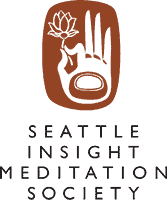See all series | See all talks
Teacher: Rodney Smith
Date: 2016-09-20
Venue: Seattle Insight Meditation Center
Series
- Continua of Practice 2015-05-12
Description
Pursuing a goal almost instinctually calls forth an egoic response of tension and personal evaluation. We usually become very critical and self-evaluative when we are challenged by an important task. It can bring up a sense of being either useful or worthless depending upon our backgrounds, but productivity always ties us to a measurable result and anything measurable usually carries a component of judgment. Productivity also engages our storyline and narrative, can activate our emotional traumas, and compounds our thinking. In short, focusing on worldly doing can create its own spiritual undoing.
When spiritual teachers suggest that the path of practice is the path of non-doing, what do they mean? Obviously it does not mean disengaging, becoming a couch potato, or stop working, and it certainly does not mean continuously sitting still and meditating. This may become clearer if we explore doing in relationship to time. Usually when we have something to do, the doing holds our attention and there is a goal we want to accomplish. From a spiritual perspective, looking ahead into the future toward a goal is a loss of connection with this moment. So the first caution is how we hold the doing. Do we lose perspective and disengage from the present moment or can we complete the task as a simple moment to moment connection? Secondly, does the doing force our pain body forward so that we lose ourselves in our psychological judgments? Suddenly we feel pressured and watched when we may be the only person in the room. If pain does arise during work, is the pain forcing an unhealthy relationship to the task at hand? Can we hold our pain body sufficiently so that we are not being governed by our unconscious tendencies?
Next is the issue of quantitative or qualitative doing. If we are just interested in getting through the project and on to the next, not only will our work suffer accordingly, but we will have lost any resemblance of caring and focused attention. Caring is not just for personal relationships, we hold a caring attention within each and every act we perform. When completing the action becomes more important than the attention offered, the end result will have little connection to wakefulness. We may accomplish the task but we will have lost our spiritual orientation in the process. All of us have experienced a piece of art or craft that was carved from wakefulness, and all of us have experience an object created with worldly intentions. We sense and feel the difference in our bodies and bones. So too every act of body, speech, and mind carries the signs and energy of wakefulness or, conversely, the blindness of unconsciousness.
Any physical action can be a product of either doing or non-doing. When we work within an anticipated result our lives will either feel rewarded or discouraged by the final product. Is it possible to work within a creative display, meeting the designated deadline but without our personal worthiness at stake? The quiet of non-doing is movement from awareness, birthed from presence. The body is simply here and can be used in the service of doing or non-doing. Why not allow the body to live without the tension of expectations as it moves throughout the day? Such movement always feels like we are at home in ourselves regardless of our location.
Homework
Changing from doing to non-doing is an essential dharma learning, since doing keeps us focused ahead of ourselves and in control. First we have to be willing to step out of our productive mode of living into a receptive one and that begins by learning to relax. Spend the week emphasizing a relaxed body and mind. Build a natural bridge between engaging and interacting with life and the qualities of ease, softness, and relaxation. Whenever you feel your body tight and tense, soften your belly and breath long slow in and out-breathes. Once you feel relaxed, carry this stance into interactions, “Seek first to understand before being understood,” How does this intention create a listening attitude? Experience the effect of listening on your heart, how it opens you to caring. How does your behavior change when you allow actions to flow from listening instead of knowing? Watch how the phrase interrupts reactive and impulsive thinking. Do you see the potential for changing many of your relationships through this intention?
Video
Link to view on Vimeo: https://vimeo.com/183694016
TalkID=519 SeriesID=61

